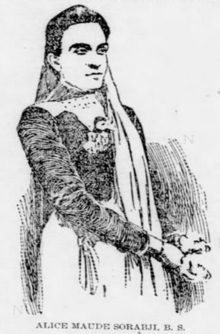Alice Maude Sorabji Pennell
Alice Maude Sorabji Pennell OBE (July 17, 1874 – March 7, 1951) was an Indian physician and writer. She was the daughter and wife of Christian missionaries, and the first woman in India to earn a bachelor of science degree.

Early life
Alice Maude Sorabji was born at Belgaum, the youngest daughter of Francina Sorabji and Reverend Sorabji Karsedji. Her mother was an educator and a Christian convert from Hinduism of tribal extraction[1]; her father was a Parsi Christian missionary. Her sisters included lawyer Cornelia Sorabji and educator Susie Sorabji.[2]
Alice Sorabji attended her family's Victoria High School in Poona, and earned a bachelor of science degree at Wilson College in Bombay, the first woman to earn that degree in India.[3][4] She was trained as a physician in London, with her older sister Cornelia's encouragement and efforts,[5] completing her studies in 1905.[2]
Career
Alice Sorabji worked at the Zenana Hospital in Bahawalpur. For her work at the Pennell Hospital at Bannu (in present-day Pakistan), she was awarded the Kaisar-i-Hind Medal in 1917. She was also appointed an OBE in 1921, for her hospital work during World War I. She retired from medical work in 1925.[2][6] She was named an Officer of the Order of Saint John of Jerusalem in 1943.[7]
She wrote a biography of her husband published soon after he died,[8] and novels including Children of the Border (1925), The Begum's Son (1928), and Doorways of the East (1931). A fourth novel remained unpublished. She also worked on women's higher education in India.[9] Later in life, she traveled, and gave lectures on Indian women and health topics.[2][10][11] "Absolutely fearless, she thinks nothing of taking an old Ford and proceeding, absolutely alone, into Afghanistan or up through the wilds of Persia," marveled a newspaper writer in 1930, when Alice Pennell was in her fifties, noting further that "she is the friend and confidente of women from all over India."[12]
Personal life
Alice Maude Sorabji married fellow physician Theodore Leighton Pennell in 1908.[13] They had a son.[14] She was widowed when Pennell died in 1912, from septicaemia.[15] She died in 1951, aged 76 years, in Findon, Sussex.[16][6]
References
- Brinks, Ellen (2016-04-15). Anglophone Indian Women Writers, 1870–1920. Routledge. ISBN 9781317180913.
- Alice Maude Sorabji Pennell, Making Britain: Discover How South Asians Shaped the Nation, 1870-1950 (Open University).
- "New Woman in India" Chicago Tribune (March 9, 1896): 3. via Newspapers.com

- "An Indian Lady Graduate" Lloyd's Weekly Newspaper (January 26, 1896): 9. via Newspapers.com

- Antoinette Burton, At the Heart of the Empire: Indians and the Colonial Encounter in Late-Victorian Britain (University of California Press 1998): 124-125. ISBN 9780520919457
- "Obituary" British Medical Journal (March 31, 1951): 706.
- "The Grand Priory in the British Realm of the Venerable Order of the Hospital of St. John of Jerusalem" The London Gazette (June 25, 1943): 2898.
- Alice Sorabji Pennell, Pennell of the Afghan Frontier (Revell, 1912).
- Mrinalini Sinha, Specters of Mother India: The Global Restructuring of an Empire (Duke University Press 2006): 178. ISBN 9780822337959
- "Women Doctors for India" Sydney Morning Herald (March 25, 1914): 5. via Trove

- "Social Background of Health in India" British Medical Journal (May 22, 1943): 641.
- Michael Pym, "India's Women Who Stand With Mahatma Gandhi" The New York Times (May 25, 1930).
- "Marriages" The Lancet (November 14, 1908): 1495.
- C. L. Innes, Lynn Innes, A History of Black and Asian Writing in Britain, 1700-2000 (Cambridge University Press 2002): 283. ISBN 9780521643276
- "Dr. Pennell, of India" The Missionary Review (June 1912): 475.
- "Deaths" British Medical Journal (March 17, 1951): 597.
External links
- Shane Gail Malhotra, "Reading between the lines, 1839-1939 : popular narratives of the Afghan frontier" (Doctoral thesis, Open University, 2013). Includes a chapter on Alice Sorabji Pennell's writings.